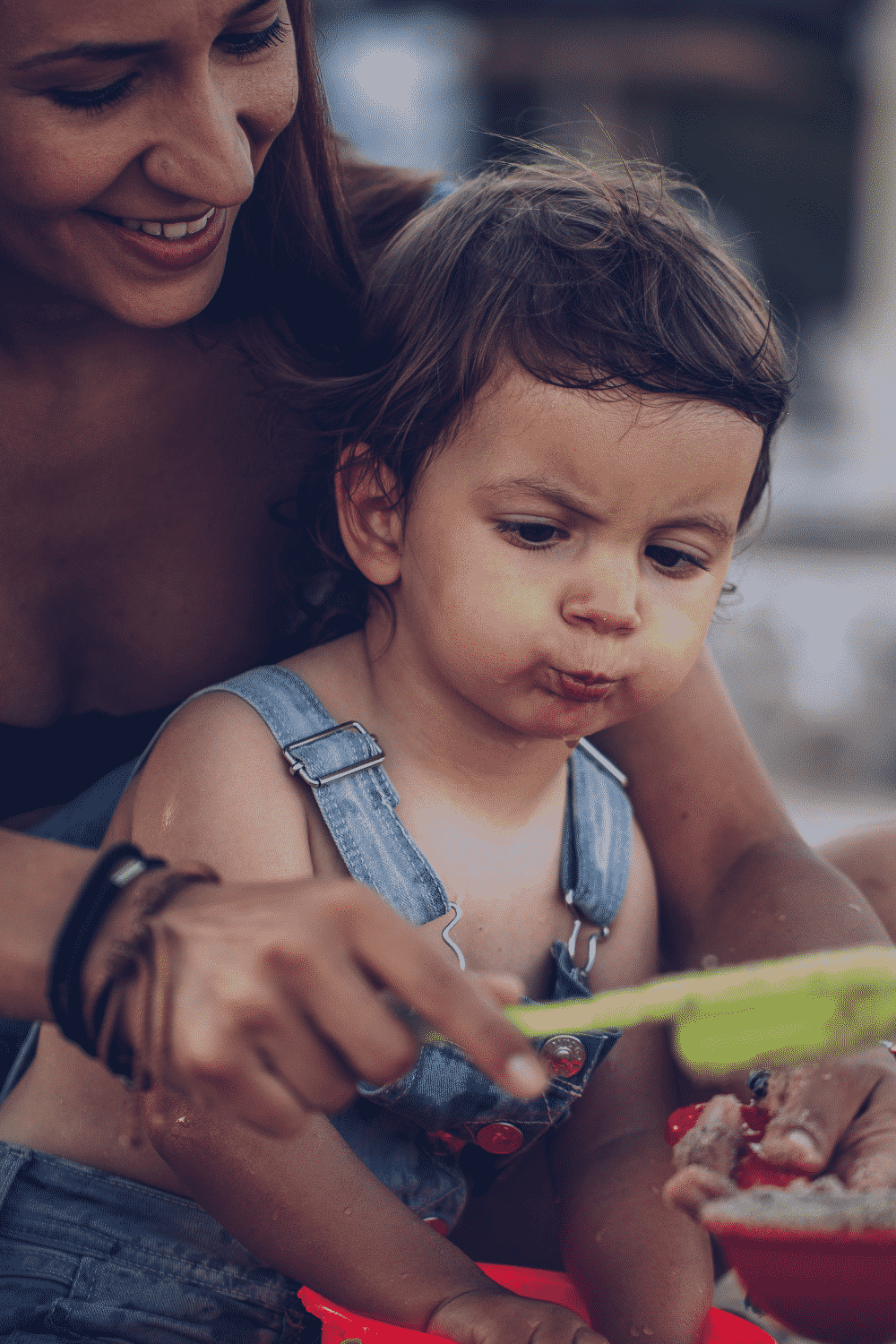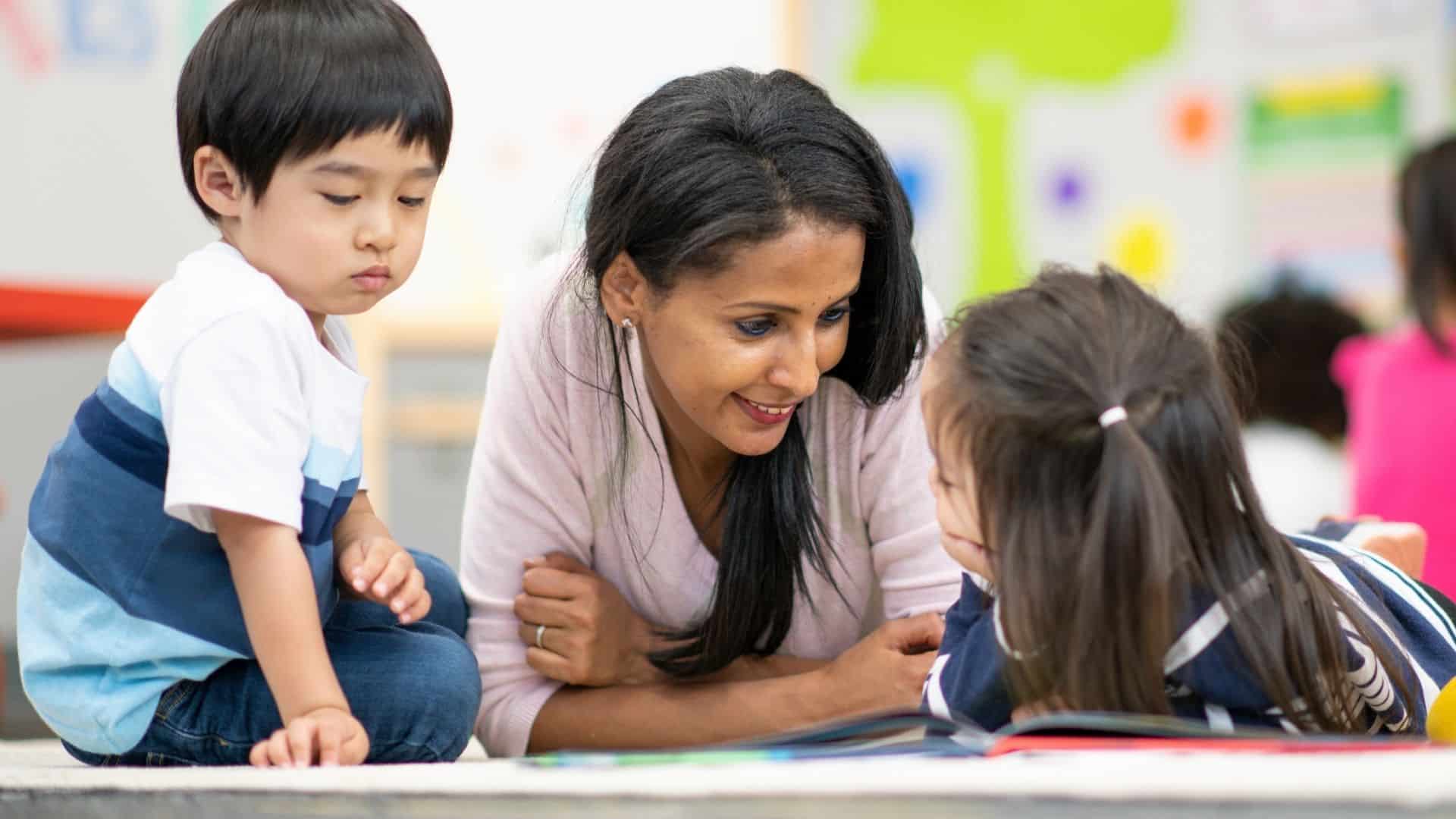Hand in Hand is designated by AMCHP as an evidenced-based Promising Practice. Learn more.
Research Model
Discover how the research team is building a strong evidence base.
Early Pilot Study
Participate in the study and get community support and new strategies for your classroom.
Research Team
Meet the early childhood education professionals spearheading this research.
Articles & Publications
Learn more about our articles and publications
Early childhood educators are central to a child's support network
Yet educators have been isolated, under-resourced, and are burning out in high numbers. Children come to school with big feelings and behaviors that can be challenging to respond to. Teachers are overwhelmed and stressed, making it hard to connect and provide the support children and their families need.
A secure caregiver-child relationship is the foundation for healthy development.
Gray, SAO, Forbes, D, Briggs-Gowan MJ, & Carter AS, 2015

The Hand in Hand Approach Helps
The 5 simple and concrete tools can buffer against educator stress while caring for children with histories of adversity.
Over the last three decades, and in over 150 classrooms, we have seen transformative outcomes for early childhood educators and the families with whom they work.
This pioneering approach:
- Transforms ECE classrooms into sources of connection and resilience
- Increases educators sense of confidence and competence in responding to children's emotions and behaviors
- Increases educator well-being
- Increases social-emotional foundations necessary for children's learning
- Decreases educator stress and isolation
- Increases positive, joyful, and playful experiences between educators and children
- Strengthens home-school partnerships
The Hand in Hand approach
nurtures strong, connected adult-child relationships
Support
Connect
Co-Regulate
Play
years
1
Hand in Hand's unique tools have helped build resilient families and supportive communities across the globe since 1989.
Certified Instructors
10
Instructors serve families and professionals on five continents in diverse communities. Training and resources are currently available in 15 languages.
thousand reached
0
We reach a growing community of parents and professionals every month through a vibrant online community.
The next goal is to scale the educator training program and
reach tens of thousands of underserved early childhood educational communities across the United States.
Read on to discover the
research projects underway to
achieve this goal, and how you can help.

Hand in Hand
is an evidenced-based
Promising Practice
Hand in Hand's approach is designated as a Promising Practice by the Association of Maternal and Child Health Programs (AMCHP).
You can learn more about how family services and federal preschool programs, center-based programs, and higher education programs for families, educators, and allied professionals can implement the approach.
View AMCHP's implementation guide
for Hand in Hand's program here
Four Phases Of Research
The Research Team was trained by Frontiers of Innovation (FOI) at the Center on the Developing Child at Harvard University in the IDEAS Impact Framework, a quick-cycle iterative and community-engaged research model that now guides the research program. The research is anticipated to be complete in four stages.
Phase 1
Feasibility Study
Completed under the mentorship of Frontiers of Innovation (FOI) at the Center on the Developing Child at Harvard University. The study evaluated the feasibility and acceptability of the 6-week experiential online course. Participants noted improved educator efficacy, reduced educator stress, and positive changes in child outcomes. Check out the Impact Report.
Phase 2: Early
Pilot Study
Serving 500+ families, we're currently running an early pilot study to document educator changes in behavior, knowledge, attitude, and skill as a result of the updated 8-week experiential online course for 50 early childhood educators around the country. Findings will be published in 2023.
Phase 3
Late
Pilot Study
We'll train and support 80-100 early childhood educators and document the outcomes such as teacher-child connectedness, decreases in teacher-student conflict, classroom climate changes, and increase in play.
Phase 4
Randomized Controlled
Trial
In this study for 50-100 educators the training course will be evaluated for its readiness to scale. Results will strengthen the evidence base and findings will be published.
Join us in this
exciting work
We welcome early childhood educators all over the US to join the 8-week experiential & online Foundations Course for Early Childhood Educators.
You'll learn 5 trauma-responsive tools to build connected classrooms, address challenging behaviors, and get some self-care you don't have to do by yourself.
Participation includes 2-3 hours a week, where you will:
- Receive personal & group mentorship during weekly 1-hour group mentoring calls led by a Certified Instructor
- Watch short videos & read articles each week
- Develop your “trauma lens”
- Learn new play-based strategies to increase cooperation and giggles
- Design Connection Plans
- Gain access to Hand in Hand's global community of parents and professionals.
Want to learn more? Check out the Course Structure and Overview and our Letter to Educators. The Foundations Course is available as part of the early pilot study.

Meet the Research Team
The multidisciplinary research team brings together a team of professionals from a range of sectors including parent education, early childhood education, early childhood special education, pediatric medicine, clinical child psychology, and developmental psychology.

Maya Colman
PhD Clinical Psychology,
MA Special Education,
Director of Programs and Research

Angela Sillars
PhD Developmental Psychology,
MA Education

Pam Oatis
MD Pediatrics
Ohio Pediatrician of the year 2011-2012

Ahava Vogelstein
MA COUNSELING PSYCHOLOGY,
GRANTS AND RESEARCH MANAGER

Anna Cole
PhD, Research Fellow, School of Sociology and Education, University of Portsmouth
Articles & Publications
This feasibility study was conducted as a Portfolio Project of Frontiers of Innovation (FOI), the R&D platform of the Center on the Developing Child at Harvard University. As a portfolio project, the Research Team received year-long mentorship to design and conduct this first phase of the research program. For more information, see the Impact Report.
This study was funded by Hemera Foundation and BIJJAR Family Foundation.
Shelley Macy, Principal Investigator, ECE Faculty at Northwest Indian College, conducted a qualitative analysis of a four-year research project teaching Hand in Hand Parenting at Northwest Indian College.
Pamela Oatis, MD, analyzed the impact of Hand in Hand’s six-week introductory class for parents in a research poster using data from 250 English-speaking and 72 Spanish-speaking parents.
Research poster presented at Mercy Children’s Hospital, Toledo, OH.
Despite the growing recognition of the central role of toxic stress in childhood emotional and behavioral challenges, and mental and physical health across the lifespan, we are just beginning to develop trauma-informed responses. Full article by Maya Coleman and Kristen Volk here.
Help fund this research
Would you like to partner with us?
If you'd like to collaborate with Hand in Hand, please fill out this form and a member of our research team will be in touch.